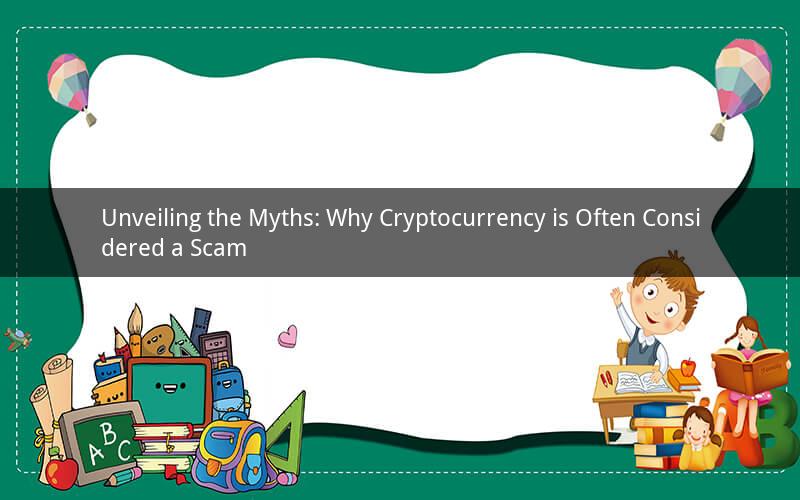
Cryptocurrency has emerged as a revolutionary financial technology, promising a decentralized and secure system for transactions. However, amidst its growing popularity, there is a persistent skepticism regarding its legitimacy. Many people believe that cryptocurrency is nothing more than a scam, raising questions about its true nature and potential. This article aims to explore the reasons behind the perception that cryptocurrency is a scam, providing insights into the concerns and misconceptions surrounding this digital asset.
1. Volatility and Price Fluctuations
One of the primary reasons why cryptocurrency is often labeled as a scam is its extreme volatility. Unlike traditional fiat currencies, the value of cryptocurrencies can skyrocket or plummet within a short span of time. This volatility has led to massive gains for some investors, but it has also resulted in significant losses for others. Critics argue that this unpredictability is a red flag, suggesting that cryptocurrency is not a reliable investment vehicle.
2. Lack of Regulation
Cryptocurrency operates outside the traditional banking system, which means it is largely unregulated. This lack of oversight has raised concerns about the security and legitimacy of these digital assets. Scammers often exploit the absence of regulations to deceive unsuspecting individuals, leading to numerous fraudulent activities. Without proper regulations in place, it is difficult to distinguish between legitimate cryptocurrency projects and fraudulent schemes.
3. High Risk of Scams and Frauds
The cryptocurrency market has been plagued by scams and fraudulent activities. From Ponzi schemes to phishing attacks, scammers have found numerous ways to exploit the vulnerabilities of cryptocurrency investors. The anonymity provided by cryptocurrencies makes it easier for scammers to operate without detection. As a result, many people view cryptocurrency as a breeding ground for scams, further reinforcing the perception that it is a scam itself.
4. Lack of Understanding and Education
One of the most significant reasons why cryptocurrency is often considered a scam is the lack of understanding and education among the general public. Many individuals invest in cryptocurrency without fully comprehending its underlying technology or the risks involved. This lack of knowledge makes them vulnerable to scams and fraudulent schemes. Critics argue that until people are adequately educated about cryptocurrency, it will continue to be associated with scams.
5. Environmental Concerns
The mining process required to create new cryptocurrency tokens is energy-intensive and environmentally harmful. Cryptocurrency mining consumes vast amounts of electricity, leading to increased carbon emissions and a negative impact on the environment. This has raised concerns about the sustainability of cryptocurrency and its long-term viability. Critics argue that the environmental impact of mining makes cryptocurrency a scam, as it goes against the principles of sustainability and environmental responsibility.
6. Lack of Trust in Centralized Authorities
Cryptocurrency offers a decentralized alternative to traditional financial systems, which has garnered both support and skepticism. While some people view it as a way to empower individuals and reduce dependence on centralized authorities, others believe that this lack of control makes cryptocurrency inherently suspicious. Critics argue that the absence of regulatory oversight and the perceived powerlessness of individuals in the face of cryptocurrency scams contribute to the perception that it is a scam.
7. Manipulation and Market Manipulation
The cryptocurrency market has been criticized for its susceptibility to manipulation. High-profile incidents, such as the 2017 Bitcoin bubble, have raised concerns about the integrity of the market. Critics argue that scammers and market manipulators exploit the lack of regulation and transparency to deceive investors and drive up prices. This manipulation has fueled the belief that cryptocurrency is a scam, as it raises doubts about its true value and legitimacy.
In conclusion, the perception that cryptocurrency is a scam is rooted in various factors, including its volatility, lack of regulation, high risk of scams, lack of understanding, environmental concerns, lack of trust in centralized authorities, and manipulation. While cryptocurrency offers numerous benefits and has the potential to revolutionize the financial industry, addressing these concerns and misconceptions is crucial for its long-term success.
Questions and Answers:
1. What are the main reasons why cryptocurrency is considered a scam?
Cryptocurrency is often considered a scam due to its volatility, lack of regulation, high risk of scams, lack of understanding, environmental concerns, lack of trust in centralized authorities, and manipulation.
2. How can individuals protect themselves from cryptocurrency scams?
Individuals can protect themselves from cryptocurrency scams by conducting thorough research, understanding the risks involved, using secure wallets, avoiding phishing attacks, and staying informed about the latest scams and fraudulent activities.
3. Can cryptocurrency be a legitimate investment?
Yes, cryptocurrency can be a legitimate investment for those who understand the risks and conduct thorough research. However, it is important to approach cryptocurrency investments with caution and not rely solely on it as a source of wealth.
4. What is the environmental impact of cryptocurrency mining?
Cryptocurrency mining consumes vast amounts of electricity, leading to increased carbon emissions and a negative impact on the environment. This environmental concern has raised questions about the sustainability of cryptocurrency.
5. How can the cryptocurrency market be made more secure and transparent?
To make the cryptocurrency market more secure and transparent, regulatory bodies can implement stricter regulations, promote transparency, and educate the public about the risks and benefits of cryptocurrency. Additionally, technological advancements can be made to enhance security measures and reduce the risk of scams and fraudulent activities.